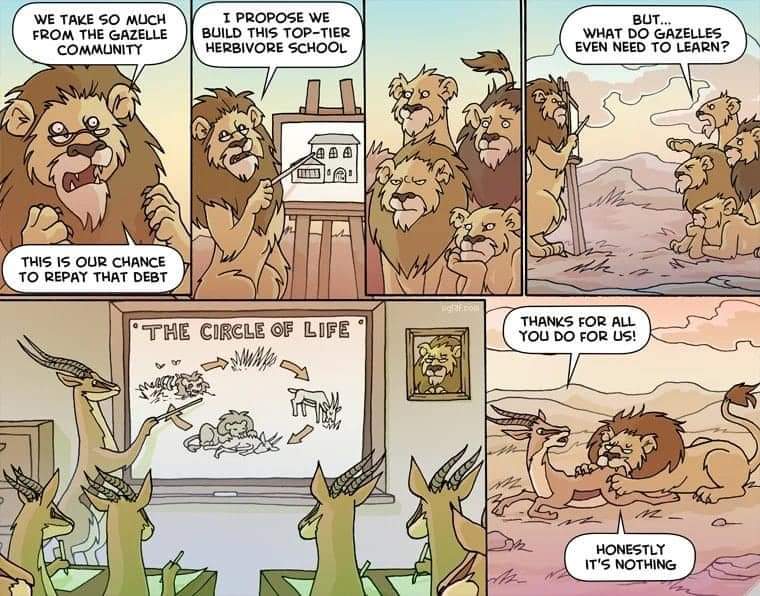this post was submitted on 25 Mar 2024
840 points (97.8% liked)
Comic Strips
15080 readers
1575 users here now
Comic Strips is a community for those who love comic stories.
The rules are simple:
- The post can be a single image, an image gallery, or a link to a specific comic hosted on another site (the author's website, for instance).
- The comic must be a complete story.
- If it is an external link, it must be to a specific story, not to the root of the site.
- You may post comics from others or your own.
- If you are posting a comic of your own, a maximum of one per week is allowed (I know, your comics are great, but this rule helps avoid spam).
- The comic can be in any language, but if it's not in English, OP must include an English translation in the post's 'body' field (note: you don't need to select a specific language when posting a comic).
- Politeness.
- Adult content is not allowed. This community aims to be fun for people of all ages.
Web of links
- !linuxmemes@lemmy.world: "I use Arch btw"
- !memes@lemmy.world: memes (you don't say!)
founded 2 years ago
MODERATORS
you are viewing a single comment's thread
view the rest of the comments
view the rest of the comments

Food, water, shelter, and healthcare are not things one chooses to buy, but things one is forced to buy to survive.
To buy these, you need money. To get money, you need a job. You also need enough money saved up to survive after you can no longer work a job.
To get and maintain a job you need to buy some other things. Exactly what other things varies by job and climate, but in general: clothes, transportation, phone, electricity.
That's a lot of things that you cannot willingly choose not to buy if you want to live.
Under a free market you choose whom to buy your food, water, and shelter from.
Water is less free than the other two markets, because water through plumbing can only come from one state-sanctioned monopoly. But there are many ways to get water outside of plumbing.
Yes, life still requires effort, even though we have civilization. When I refer to freedom, I am not referring to unconditioned consciousness arising from pure void, or whatever matter-and-energy-free state you seem to think free markets should be compared to.
Same points repeated.
Yes. In case there’s any confusion, “free market” does not refer to a state of being free to choose whether to eat, sleep, drink, etc. Freedom in this case does not refer to a godlike state of unconditioned bliss.
What that means practically, in this discussion, is that when a person is selling water in a free market, nobody is forced to do business with them because they have competition.
A person who gets rich selling water in a free market does so by providing the best water at the best price.
If all the sellers of vacuum cleaners decide to have high prices, people can just choose not to buy vacuums. If all the electricity providers or food providers in an area decide to raise prices, people in that area are still forced to buy it.
I believe capitalism doesn't work without the option of not buying it at all. In markets with few options and that you cannot choose not to buy it, sellers can all collectively jack up prices.
Here's an FTC report saying that they found that large food retailers used the supply chain issues to make deals with suppliers to supply them over smaller grocery stores. This harmed small local groceries. The report also says they found reason to further investigate the large grocery chains taking advantage of this lack of supply to local groceries to increase prices for customers by more than the increase in input cost. They were able to price gouge because only 8 firms control over half of grocery sales and people can't choose not to get groceries.
Electricity providers are a special case because they are a (government-enforced) monopoly.
Water providers have an incentive not to follow the other ones when they raise prices, because they can make more profit, when others raise their prices, by raising their own less so, or not at all, than they would make by raising their prices to match the competition’s prices.
If one starts charging $10/gallon while the others stay at $1/gallon, he loses all his business. That’s called an “incentive structure” and while it doesn’t force them to keep low prices the same way a gun to their head would, but it does do so effectively, by making that the optimum path to profit.
As it turns out, people are motivated to make more money, which is why markets work at all.
Yes what you said is true: IF everyone starts charging more for water, then people must pay more.
The reason that statement doesn’t matter is that the IF condition is never true in a free market. That’s exactly what free markets provide: the incentive structure from competitive pricing that regulates prices and keep price fixing from happening.